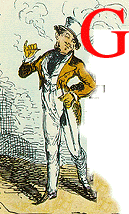Scanned, edited, and formatted for html by George P. Landow. The decorative initial "g" that appears immediately below is by George Cruikshank.]
 eorge du Maurier, or (to give him his full
name) George Louis Palmella Busson du Maurier,
the genial and gentle du Maurier, famous alike in Art
and Literature, must have a chapter to himself; for not
only was he one of the most intimate and most beloved
of my father's friends, but the correspondence between the
two men was so characteristic that some of it must find a
place in this volume.
eorge du Maurier, or (to give him his full
name) George Louis Palmella Busson du Maurier,
the genial and gentle du Maurier, famous alike in Art
and Literature, must have a chapter to himself; for not
only was he one of the most intimate and most beloved
of my father's friends, but the correspondence between the
two men was so characteristic that some of it must find a
place in this volume.
It was some time in the fifties — just before du Maurier joined the Punch staff — that they first met, and, as might be expected of such kindred spirits, their acquaintance speedily ripened into a friendship that became ever deeper as the years went by.To both alike Society opened its arms, and for some years they mixed freely, if not frequently, with the gay and gilded throng, amused with what they saw, and gradually drawing to themselves those whose qualities of heart and mind were most in accord with their own. But with the advent of middle age came an increased and increasing distaste for the frivolities of what Byron so aptly calls "the polished horde formed of two mighty tribes, the bores and bored," and from that time forward they carefully avoided assemblies where (as is too often the case nowadays) wealth is more favoured than talent, and vulgar display the chief feature of the entertainment.
Of du Maurier, perhaps, more than of any other artist, it may be said that the man himself appears in his works; for in all that long series of inimitable drawings that for years added so greatly to the popularity of Punch, the refinement of his mind, his keen sense of humour, and his reverence for truth and manliness are no less conspicuous than his art. In private life he was habitually reserved and unobtrusive; but to Millais, whom he knew to be moved by the same impulses as himself, and whose ideals were in the main much the same as his, he opened his heart as freely as a child, discoursing with him on every subject under the sun, and often on matters that he would confide to no one else.
His own weakness was Size. Though strong and active, he was but a small man himself, and perhaps on that account his highest admiration, whether for man or beast, was reserved for creatures of colossal proportions. His heroes and heroines must all stand three or four inches over six feet, and their actions must be of the Homeric order. His dog, too, must be the biggest of his species; and in that matter his desire was gratified by the possession of "Chang," a huge St. Bernard with which all readers of Punch were familiar.
When a giant of either sex appeared in London, he would spend all his pocket-money in seeing the monstrosity and treating his friends to a view; and more than once he hinted that if he could have been the real "Gulliver" his happiness would have been complete. In a letter to Millais in March, 1869, he implores him to come and see a wonderful giantess from Canada who was then on view in London; but as my father was away at Hastings, recruiting his health after a serious attack of typhoid fever, he was obliged to decline the invitation. du Maurier then sent him a full description of the creature, along with a sketch which showed her to be, like so many of these people, all but devoid of brains, and with hardly so much as an apology for a chin. In reply Millais thus addressed his friend: —
TO MR. du Maurier.
"Dear du Maurier, you can't be sorrier —
In lower spirits than I'm in.
As you express, the giantess'
Failure is a want of chin.
"And oh! that goitre, as I loiter,
Haunts me on the sad sea sand,
It seems to mingle with the shingle
That drowns the Hastings German band.
"Quite entre nous, between us two,
I've pictured in my mind her presence,
And (wasn't it shocking?) I fancied her rocking
J. E. M. in his convalescence.
"Then on my pillow, to the sound of the billow,
Dozing, methought a voice I heard;
She spoke Nova Scotian, but full of emotion,
Singing 'I would I were a bird.'
"Now you have quell'd and completely dispell'd
My little dream of wonderland.
That outline facial, however palatial,
Is just the thing I cannot stand.
"Perhaps 't is better that your letter
Has divulged the cruel truth.
Sway domestic reigns majestic
Over this unsullied youth.
"It were wiser we exorcise her
When next a giantess is shown;
Taking each other, like a Siamese' brother,
Instead of going there alone.
"For should a mighty, breathing Clytie,
Ten feet high and warranted real,
With yellow hair, all debonnair,
Bound simply with a fillet of veal —
"A real Colossus — come across us,
Such as this, where are poor we!
The strings of my lyre emit Greek fire
At the very thought of such miseree.
"So let us abjure these freaks impure,
And fondle our latest family pledge,
Nor tempt the mystic nature artistic
Which ever trembles on the edge."
Hastings, March, 1869. J. E. M.
Bibliography
Millais, John Guile. The Life and Letters of John Everett Millais, President of the Royal Academy. 2 vols. New York: Frederick A. Stokes, 1899. 265-67.
Last modified 23 August 2004